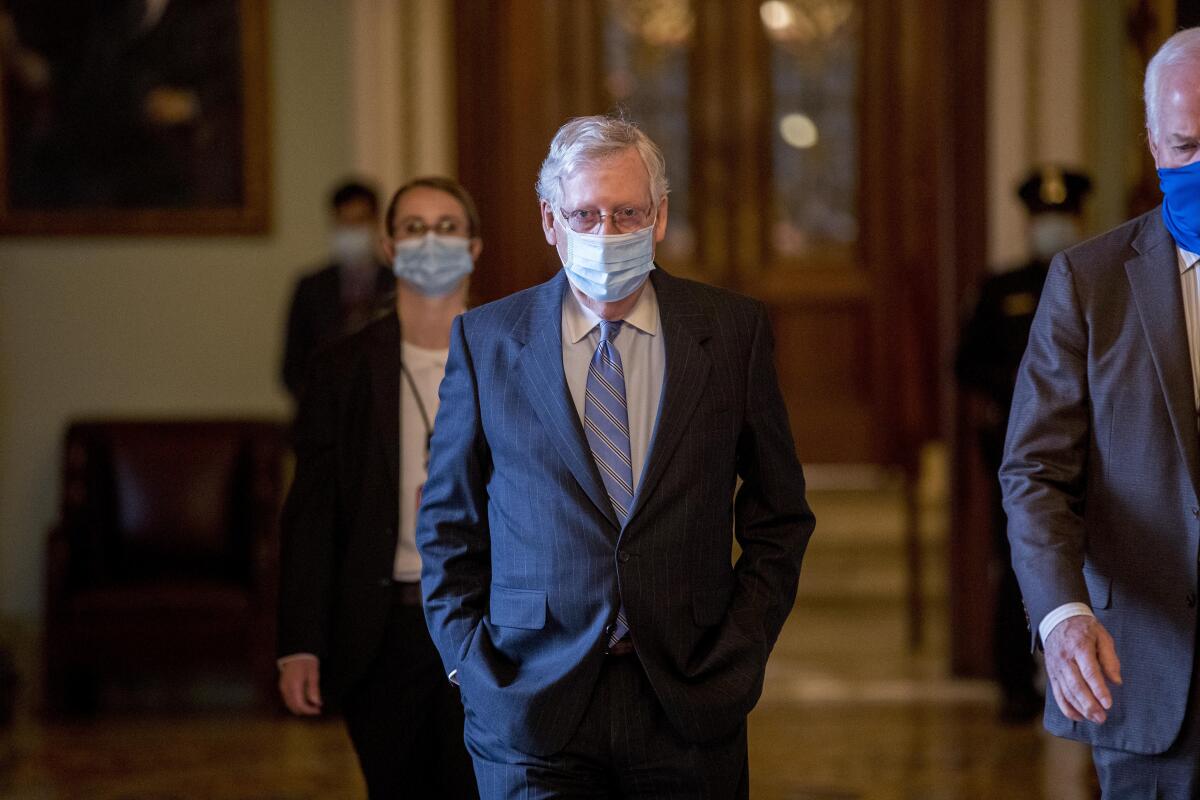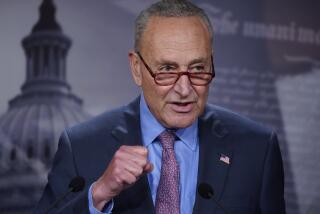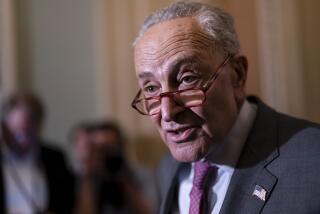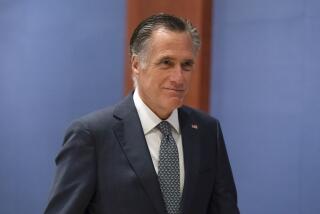No stimulus checks for Americans in slimmed-down GOP coronavirus relief package

- Share via
WASHINGTON — Senate Republicans plan to vote later this week on another economic relief package for Americans dealing with the COVID-19 pandemic, but the slimmed-down plan — which does not include new checks for individuals — is already a deal-breaker for Democrats, ensuring that the stalemate will continue.
The Republican proposal would restore enhanced unemployment benefits through Dec. 27 but halves the amount to $300 per week. It would also provide funding for schools and childcare centers, a new round of the popular Paycheck Protection Program and liability protections for businesses.
The $500-billion plan is far less than the minimum $2.2 trillion that Democrats want to spend on a new package, and even less generous than the $1-trillion plan Republicans unveiled just weeks ago.
In July, Senate Majority Leader Mitch McConnell (R-Ky.) proposed a package that included $1,200 checks to many individuals and $500 for each qualifying child. But seemingly unable to get support from his own party’s members, McConnell abandoned the provision for checks in the latest proposal.
The new GOP effort is designed to pressure Democrats to move ahead with ideas both parties can accept, rather than risk passing nothing at all.
The two parties have been mired in a standoff over a new bill since House Democrats approved their own $3.4-trillion package in May.
Businesses fear they’ll be blamed for COVID-19’s spread. They’re fighting for measures to protect them from lawsuits over infections, hospitalizations and deaths.
McConnell, who has refused to bring up the House plan in the Senate, on Tuesday accused Democratic leaders Charles E. Schumer (D-N.Y.) and Nancy Pelosi (D-San Francisco) of holding up further economic relief for political reasons.
“Everything Speaker Pelosi and [Senate Minority] Leader Schumer have done suggests one simple motivation: They do not want American families to see any more bipartisan aid before the polls close on President Trump’s reelection,” McConnell said in a statement. “They have taken Americans’ health, jobs, and schools hostage for perceived partisan gain.”
But Democrats say they won’t support a piecemeal approach and have already rejected the GOP plan as “emaciated.” Schumer and Pelosi said Republicans should have been working on this legislation months ago.
“As they scramble to make up for this historic mistake, Senate Republicans appear dead-set on another bill which doesn’t come close to addressing the problems and is headed nowhere,” they said in a statement.
In addition to lacking individual payments, the new GOP plan does not include any funding for state and local governments, a priority for Democrats.
The standoff comes as political control of the Senate remains up in the air. Democratic challengers in several states are within striking distance of unseating Republican incumbents, which could flip control of the chamber from Republicans to Democrats.
Republicans in those close races — as well as some House Democrats facing formidable challengers — are particularly eager to approve a new coronavirus relief package. But other Republicans are more concerned with how much additional economic stimulus should be provided at the expense of the federal debt.
It is unclear how much support the bill has among Senate Republicans. After introducing the GOP package in July, McConnell never even brought it to a vote amid Republican skepticism.
But GOP lawmakers will have to show their cards on Thursday when a procedural vote on the measure is held. With Democrats lined up against it, it is all but certain not to get the 60 votes needed to overcome a filibuster.
McConnell said some Republicans would like to see a more generous package. “Yet Republicans believe the many serious differences between our two parties should not stand in the way of agreeing where we can agree and making law that helps our nation,” he said.
In a nod to the U.S. Postal Service’s controversial service cuts and financial challenges, the Republican plan would forgive $10 billion in debt held by the agency. Republicans said it mirrored an offer the administration made to Democrats.
The legislation would provide a series of tax breaks for parents dealing with virtual learning as the virus has shuttered schools in some parts of the country. Parents would be able to use tax-advantaged 529 savings plans for expenses such as books, online materials and licensed tutoring for students. Parents who home school could use the money for educational expenses.
The plan also includes a school-choice initiative that would provide a two-year tax break for donations to nonprofit organizations that offer scholarships to private-school students.
The plan would provide $105 billion for schools and $15 billion for childcare centers. An additional $16 billion would fund coronavirus testing, contact tracing and surveillance. Another $31 billion would go toward the development of a vaccine, therapeutics and diagnostics, as well as vaccine distribution.
The new round of the Paycheck Protection Program would be valued at $258 billion to assist struggling small businesses.
The legislation also provides funding for programs to benefit two industries hit hard by the pandemic. Farmers would get $20 billion in assistance, and fisheries would get $500 million in assistance.
The bill is partially paid for by redirecting at least $350 billion in unspent money from the CARES Act, the coronavirus relief bill approved earlier this summer.
More to Read
Get the L.A. Times Politics newsletter
Deeply reported insights into legislation, politics and policy from Sacramento, Washington and beyond. In your inbox three times per week.
You may occasionally receive promotional content from the Los Angeles Times.












